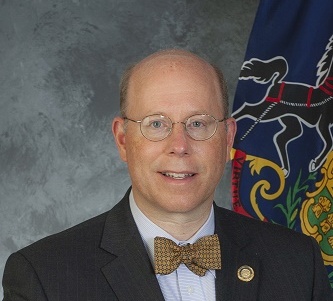YORK – Pennsylvania’s new, lower Corporate Net Income Tax (CNIT) rate will put Pennsylvania on a path to 4.99% for a healthier, more competitive business environment that attracts good-paying jobs and moves our economy forward.
“I’ve been calling for a lower Corporate Net Income Tax rate since I first took office and I’m thrilled that we were able to make this happen in my last budget,” said Gov. Tom Wolf. “This lower rate is a game-changer for business in PA. We’re going to ensure tax fairness, make Pennsylvania a top location for businesses, and bring new, good-paying jobs here for Pennsylvanians.”
Pennsylvania is officially on a path to a 4.99% CNIT rate—half of its current 9.99% rate—which will place the commonwealth as the seventh lowest CNIT rate in the nation.
“We are here to celebrate a new chapter in Pennsylvania’s story and to highlight what we can collectively achieve when we work together by putting Pennsylvania first,” said Luke Bernstein, president and CEO of the PA Chamber of Business and Industry. “We are proud to have worked alongside Gov. Wolf and a bipartisan coalition of lawmakers and want to thank the governor and legislative leaders for working with us to make these long sought-after tax reform goals a reality. At a time when compromise can seem elusive, our collective efforts to put Pennsylvania’s economic future first has made our commonwealth significantly more competitive and sends the important message to job creators and investors worldwide that Pennsylvania is open for business. We look forward to carrying this momentum forward with additional pro-growth reforms that promote Pennsylvania as the best place to live, work, and raise a family.”
CNIT is a state tax paid by businesses within Pennsylvania on their corporate profits. It is a major piece of states’ business tax climate that contributes to companies’ decisions on where they decide to establish job-creating business operations. Pennsylvania’s 9.99 percent rate was the second highest in the country among the 44 states that levy a CNIT. The 9.99 percent rate often posed a barrier to Pennsylvania’s ability to attract new business and new jobs.
By improving the competitiveness of Pennsylvania’s business climate with a lower CNIT rate, Wolf is welcoming businesses to take root here or expand their current operations – both of which would lead to new, good paying jobs for Pennsylvanians. It also sends an immediate signal to business leaders that Pennsylvania is open for business.
“Lowering the CNIT makes Pennsylvania more competitive in attracting business and economic development projects and means more jobs and more investment coming into our communities,” said Department of Community and Economic Development Acting Secretary Neil Weaver. “This also shows that we are committed to keeping existing Pennsylvania businesses here in the commonwealth by offering a business climate that makes sense for companies’ bottom line as they continue to grow.”
Pennsylvania’s new, competitive CNIT rate is just one more benefit that makes Pennsylvania a great place to do business, including:
- A strategic East Coast location within a day’s drive of nearly 40 percent of the United States population and 60 percent of the Canadian population.
- A workforce fueled by world-class higher education and research institutions with six universities ranked in the top 100 nationwide.
- An affordable cost of living paired with abundant recreational and cultural opportunities.
Reducing Pennsylvania’s CNIT rate was a bipartisan effort and priority. Gov. Wolf was joined today by Representatives Carol Hill-Evans, Mary Jo Daley, and Greg Rothman.
“Gov. Wolf has asked for a reduction of the CNIT in nearly every budget he introduced and I have been proud to sponsor legislation in several sessions to get that done,” said Rep. Daley. “Working with staff in the Department of Revenue and the House Democratic Appropriations Committee, I am hopeful that the plan for reducing the CNIT will encourage new businesses and manufacturers to open shop in Pennsylvania, creating good jobs and boosting local economies.”






















